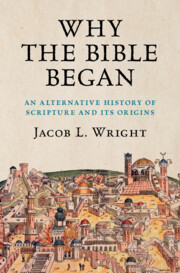Book contents
- Why the Bible Began
- Why the Bible Began
- Copyright page
- Dedication
- Contents
- Figures
- Maps
- Acknowledgments
- Prologue
- Introduction
- Part I The Rise and Fall
- Part II Admitting Defeat
- Part III A New Narrative
- Part IV A People of Protest
- 22 The Matriarch
- 23 The Hero
- 24 The Other
- 25 The Soldier
- 26 The Prophet and the Priest
- 27 The Sage
- 28 The Poet
- 29 The Queen
- 30 Conclusions
- Subject Index
- Scholars Cited
- Biblical References
- References
22 - The Matriarch
Women and the Biblical Agenda
from Part IV - A People of Protest
Published online by Cambridge University Press: 13 July 2023
- Why the Bible Began
- Why the Bible Began
- Copyright page
- Dedication
- Contents
- Figures
- Maps
- Acknowledgments
- Prologue
- Introduction
- Part I The Rise and Fall
- Part II Admitting Defeat
- Part III A New Narrative
- Part IV A People of Protest
- 22 The Matriarch
- 23 The Hero
- 24 The Other
- 25 The Soldier
- 26 The Prophet and the Priest
- 27 The Sage
- 28 The Poet
- 29 The Queen
- 30 Conclusions
- Subject Index
- Scholars Cited
- Biblical References
- References
Summary
The five daughters of the recently deceased Zelophehad are standing at the entrance of the Tabernacle. This hallowed place was the deity’s domicile, requiring the utmost respect and reverence. But instead of praying and worshipping there, these women are protesting.
- Type
- Chapter
- Information
- Why the Bible BeganAn Alternative History of Scripture and its Origins, pp. 355 - 365Publisher: Cambridge University PressPrint publication year: 2023



